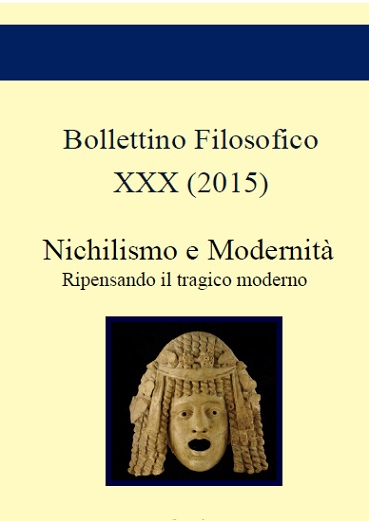Seminare «una quantità di denti di drago». L’anomalia tebana e il significato politico di un modello tragico
Abstract
One of the works that close the golden age of the Attic tragedy, Euripides’ Bacchae, has been studied by scholars interested in showing how tragic theatre derives from religious ritual. Among others, Cambridge Ritualists and Karl Kerényi saw in the sacrifice of Pentheus/Dionysus the mise-en-scène of the primary homicide that founds both the ritual sacrifice and the order of tragic representation. The true subject of Euripides’ tragedy is nevertheless violence, whose religious legitimitation comes before the political system. The sense of the “Theban anomaly” – that can later be seen in the events involving the Labdacides and Oedipus – lies in this legitimation of the violence that founds the political system. In the mortal combat between Pentheus, the regent, and Dionysus, the demigod whose birth is directly related to the vicissitudes of the family that reigns in Thebes, the conflict between religion and politics comes to light. That conflict recalls the myth of the foundation of the town. Thebes is founded by Cadmus, who, after killing the dragon, sows his teeth. From these rise the Spartoi, violent warriors that, immediately after coming to life, kill each other. As witnessed by Pentheus and Oedipus, the violence of the origins extends to the following events of the town. From this point of view the Bacchae can be of great importance to understand the connection between religion, violence and politics. This connection doesn’t escape Nietzsche’s notice. In aphorism 472 (Religion and government) of Human, All-Too-Human, a small but meaningful hint to the background of Euripides’s tragedy can be found.
Downloads
Bollettino Filosofico pubblica in internet, ad accesso aperto, con licenza:
|
|
CCPL Creative Commons Attribution |
L'autore conserva il copyright sul suo contributo, consentendo tuttavia a chiunque "di riprodurre, distribuire, comunicare al pubblico, esporre in pubblico, rappresentare, eseguire e recitare l'opera", purché siano correttamente citati l'autore e il titolo della rivista. L’autore, al momento della proposta di pubblicazione, è inoltre tenuto a dichiarare che il contenuto e l’organizzazione dell’opera è originale e non compromette in alcun modo i diritti di terzi, né gli obblighi connessi alla salvaguardia di diritti morali ed economici di altri autori o di altri aventi diritto, sia per testi, immagini, foto, tabelle, sia per altre parti di cui il contributo può essere composto. L’autore dichiara altresì di essere a conoscenza delle sanzioni previste dal codice penale e dalle leggi speciali per l’ipotesi di falsità in atti ed uso di atti falsi, e che pertanto Bollettino Filosofico è esente da qualsiasi responsabilità di qualsivoglia natura, civile, amministrativa o penale, e sarà dall'autore tenuta indenne da qualsiasi richiesta o rivendicazione da parte di terzi.
